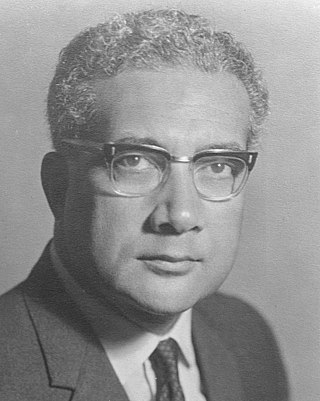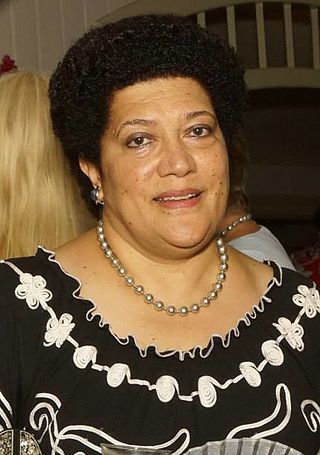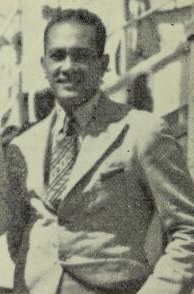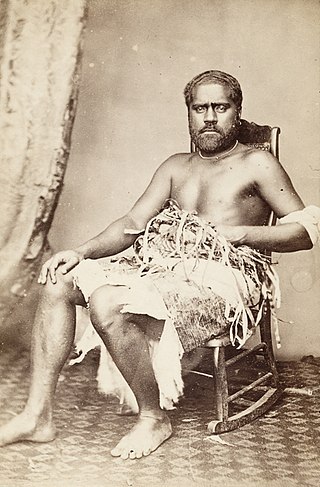
RatuSir Kamisese Mara, was a Fijian politician who served as Chief Minister from 1967 to 1970, when Fiji gained its independence from the United Kingdom, and, apart from one brief interruption in 1987, as the first Prime Minister from 1970 to 1992. He subsequently served as president from 1993 to 2000.

Adi Koila Mara Nailatikau is a Fijian lawyer, who has served as a diplomat and politician. She was also First Lady of Fiji from 2009 until 2015, as the wife of Ratu Epeli Nailatikau, the President of Fiji.

The Alliance Party, was the ruling political party in Fiji from 1966 to 1987. Founded in the early 1960s, its leader was Kamisese Mara, the founding father of the modern Fijian nation. Widely seen as the political vehicle of the traditional Fijian chiefs, the Alliance Party also commanded considerable support among the Europeans and other ethnic minorities, who, although comprising only 3–4% of Fiji's population, were over represented in the parliament. Indo-Fijians were less supportive, but the Fijian-European block vote kept the Alliance Party in power for more than twenty years.

Brigadier-General RatuEpeli Nailatikau, is a Fijian chief who was President of Fiji from 2009 to 2015. He has had a long career in the Military, diplomatic service, and government. From 2001 to 2006 he served as Speaker of the House of Representatives – the lower and more powerful chamber of the Fijian Parliament. He was also the chairman of the Parliamentary Appropriations Committee and of the House Committee. On 8 January 2007, he was appointed the interim Minister for Foreign Affairs and External Trade; he was moved to the post of interim Minister for Provincial Development and Multi-Ethnic Affairs in September 2008. In October 2008, he became Indigenous Affairs Minister "and effectively Great Council of Chiefs chairman". On 17 April 2009, he was appointed Vice-President by the military government.

Articles about people, places, things, and concepts related to or originating from Fiji, include:

RatuSeru Epenisa Cakobau was a Fijian chief, monarch, and warlord (Vunivalu) who united part of Fiji's warring tribes under his leadership, establishing a united Fijian kingdom. He was born on Natauloa, Nairai Island in Lomaiviti but spent his youth on Vanuaso, Gau, Lomaiviti, later returning to Bau to re-establish his Father's Ratu Tanoa Visawaqa reign. Ratu Epenisa Seru Visawaqa was given the name "Cakobau" meaning destroyer of Bau, in reference to his grandfathers' (Nailatikau) effort to first claim the tile from the people of Butoni and Lovoni, returned with most of his warriors from Vanuaso, Gau, Lomaiviti to coup the leadership in Bau then and later takeover his father's title; known after his father as the 6th "Vunivalu" or Warlord of Bau.

RoLala, Lady Mara, maiden name Litia Cakobau Lalabalavu Katoafutoga Tuisawau was a Fijian chief, who was better known as the widow of Ratu Sir Kamisese Mara, modern Fiji's founding father who served for many years as Prime Minister and President of his country. As Fiji's First Lady, Adi Lala took on a diplomatic role, frequently representing her country abroad. She was regarded as a formidable and astute woman, whose influence on her husband was said to be considerable.
Ratu is an Austronesian title used by male Fijians of chiefly rank. An equivalent title, adi, is used by females of chiefly rank. In the Malay language, the title ratu is also the traditional honorific title to refer to the ruling king or queen in Javanese culture. Thus in Java, a royal palace is called "keraton", constructed from the circumfix ke- -an and Ratu, to describe the residence of the ratu.

RatuNaiqama Tawake Lalabalavu MBE is a Fijian Paramount Chief and the current speaker of the parliament. He had served as the leader of the opposition.

The Fijian Association Party (FAP) is a former political party in Fiji. It played a significant role in Fijian politics throughout the 1990s but lost all of its seats in the House of Representatives in the parliamentary election of 2001.
Naming conventions in Fiji differ greatly, both between and within ethnic groups in Fiji. Indigenous Fijians have a set of cultural practices which today are more loosely followed, and to some extent blended with elements of European culture with regard to names. In the Indian community, traditional Indian naming practices co-exist with influence from the Fijian and European cultures.

The Christian Democratic Alliance, better known locally by its Fijian name, Veitokani ni Lewenivanua Vakarisito (VLV), was a Fijian political party that operated in the late 1990s and early 2000s.
RatuCokanauto Tu'uakitau was a Fijian chief and politician. He was the scion of a distinguished family, as a son of Ratu Sir Edward Cakobau, and brother of Ratu Epeli Nailatikau, who had served as President of Fiji from 2009 to 2015.
AdiAteca Moceiwaqa Mara Ganilau was a Fijian public figure and the eldest daughter of the former Prime Minister and President, the late Ratu Sir Kamisese Mara. Later in life she made many statements to the press about her family and the government.

RatuSir Edward Tuivanuavou Tugi Cakobau was a Fijian chief, soldier, politician and cricketer. He was a member of the Fijian legislature from 1944 until his death, also serving as Minister for Commerce, Industry and Labour and Deputy Prime Minister. During the 1940s he made two appearances for the Fiji national cricket team.

Fiji was an independent state from 1970 to 1987, a Commonwealth realm in which the British monarch, Elizabeth II, remained head of state as Queen of Fiji, represented by the Governor-General. The state was the successor of the British Colony of Fiji which was given independence in October 1970 and it survived until the Republic of Fiji was proclaimed on 6 October 1987 after two military coups, at which time Queen Elizabeth II was removed as head of state, albeit, without any consent from the people of Fiji themselves.
Queen Victoria School (QVS) is a school in Fiji. It was established in 1906 in Nasinu to provide education to the sons of Fijian Chiefs. It later moved to Nanukuloa in Ra when World War II broke out; then the school was moved to Lodoni where the two schools QVS and RKS operated side by side before eventually moving to its current site at Matavatucou, Tailevu. It then accepted students from Fijian villages based on their results in a secondary entrance examination.

RatuEpeli Nailatikau I was a Fijian Paramount Chief, who was posthumously made the Vunivalu of Bau.